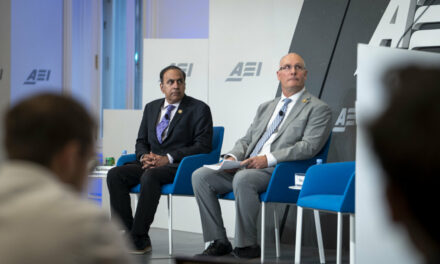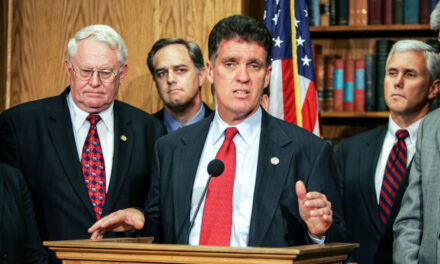We support our Publishers and Content Creators. You can view this story on their website by CLICKING HERE.
The assistant energy secretary refuted the significance of the claim, saying the decision to pause LNG was based on multiple reports.
House Republicans say the Biden administration buried a 2023 analysis that cautioned against imposing its January 2024 pause in processing new liquified natural gas (LNG) export permits and continues to dodge congressional requests to provide documents that justified the decision.
“Reports indicate that before the ban, the White House met with activists and TikTok influencers—I’m not making that up—who were adamant the administration take radical steps to address climate change and eliminate fossil fuels,” said the subcommittee’s chair, Rep. Pat Fallon (R-Texas).
Despite a year of committees requesting documents relevant to the pause with little success, Fallon said it was upsetting to learn through a nonprofit’s Freedom of Information Act (FOIA) request that 97 documents totaling 4,354 pages of LNG analyses were not provided by DOE in response to queries.
“As it turns out, there may have already been a 2023 study in existence that the department kept under wraps and is still fighting to withhold,” Fallon said.
“It appears possible that when the information … did not fit the narrative pushed by the White House, that information was buried in an attempt to clear the way for a more politically favorable analysis.”
Assistant U.S. Secretary of Energy for Fossil Energy and Carbon Management Brad Crabtree denied knowledge of any such study.
“I’ve not been presented with the document, so I’m not aware of what you’re referring to,” he said, noting that if it exists, it is among many studies that prompted the pause.
Under the Natural Gas Act, DOE must review applications to export LNG to ensure they are “consistent with the public interest,” primarily if exports would raise domestic prices and cause environmental damage. DOE last conducted such a study in 2018.
Regardless of the study, the permit pause is set to be lifted on Jan. 20, 2025, after President-elect Donald Trump is sworn in. Repealing the pause is among a flurry of “Day One” executive orders he vows to issue.
Crabtree confirmed the report would be published in “mid-December” and would include a 60-day comment period.
House Republicans maintain that the Biden administration has never been transparent about the data it used to justify the pause.
An LNG tanker is guided by tug boats at the Cheniere Sabine Pass LNG export unit in Cameron Parish, La., on April 14, 2022. Marcy de Luna/Reuters
Documents Acknowledged, Not Released
The revelation that nearly 100 documents spanning more than 4,000 pages were not provided in response to queries inadvertently surfaced in a Sept. 13 FOIA request filed by Government Accountability & Oversight (GAO), a Washington-based “public interest” watchdog.
The nonpartisan nonprofit says that to support the permit freeze, the administration tossed analyses by DOE’s National Energy Technology Lab and the U.S. Energy Information Administration and, instead, relied on a 2023 study that was not peer-reviewed and has since been rebuffed.
“The work of Dr. Howarth played no role in the decision,” Crabtree said. “Our methodology is fundamentally different from that of Mr. Howarth.”
GAO’s FOIA seeks “any LNG export study transmitted by the National Energy Technology Lab to DOE’s Office of Fossil Energy and Carbon Management between Jan. 1, 2023 and Oct. 31, 2023.”
DOE, however, “has unilaterally reinterpreted” what documents GAO is seeking “as applying only to records [DOE] asserts are ‘final’ or ‘ready for release’ for the public’s view,” it maintains.
Reps. Russell Fry (R-S.C.), August Pfluger (R-Texas), Scott Perry (R-Pa.), Lauren Boebert (R-Colo.), and Clay Higgins (R-La.) interrogated Crabtree about the undisclosed documents and why DOE is not releasing them.
“It is my understanding our team that works on document production has been in cooperative engagement with the committee,” Crabtree said, adding “four document distributions” fostered by GAO’s FOIA have been released and “the next one, I understand, is planned for Friday.”
He said 2,000 pages had been made public since September but that he’s “not part of the process”
“So I can’t speak to the details of that process. In my role, I have no involvement in it. But if you feel that the department has not been responsive to the committee, I’m happy to take any specific concerns back to that team,” he said.
Boebert said Crabtree’s responses “may be the reason why we have to create a … Department of Government Efficiency, to have actual oversight and accountability on bureaucrats.”
A heat exchanger and transfer pipes at Dominion Energy’s Cove Point LNG Terminal in Lusby, Md., in this file image. Cliff Owen/AP Photo
Podesta No-Show
Fallon noted that senior adviser to the president for international climate policy John Podesta was “invited” to testify and that it was “unfortunate” that he opted not to.
“These are questions I would have asked him,” he said. “How many times did he meet with TikTok influencers on climate issues leading up to or following the announcement of the LNG export ban? Was the White House relying on TikTok influencers for policy advice when it pushed the LNG ban? Did the White House vet them for foreign influence or sponsorship?”
John Podesta’s brother, Tony Podesta, “is known to have lobbied for foreign LNG companies, including one co-owned by a Qatar state-run energy company,” he said.
Since the pause was imposed, Qatar has “secured long-term LNG export contracts, invested in export infrastructure, and increased capacity, while the United States falls behind competitively,” Fallon said.
Crabtree said he knows nothing of such meetings and said Qatar’s increased LNG capacity “was years in the making.”
Ranking member Rep. Melanie Stansbury (D-Colo.) called the hearing “a rehash of a topic we’ve already covered,” describing the uproar as “a politically manufactured non-issue” stewing in irony.
It’s “interesting” that Republicans “are suddenly very concerned about having social media influencers involved in government decision-making. I hope that will extend to the new subcommittee that a certain billionaire social media owner is hoping to intersect with right here in this committee in the coming years,” she said.
She said she’s “intrigued” that colleagues “are suddenly very concerned about foreign influence over American energy production,“ alleging that ”Russian disinformation” is heard daily inside the committee.

 Conservative
Conservative  Search
Search Trending
Trending Current News
Current News 







